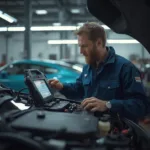Understanding what’s happening under the hood of your GM vehicle can often feel like trying to decipher a foreign language. When your check engine light flashes, it’s your car’s way of communicating that something isn’t right. Luckily, this communication comes in the form of OBD2 trouble codes, and while they might seem cryptic, they hold the key to understanding and fixing your car’s woes. This comprehensive guide delves into the world of OBD2 trouble codes specific to GM vehicles, empowering you to take control of your car’s health.
What are OBD2 Trouble Codes and Why Should You Care?
OBD2, or On-Board Diagnostics, is a standardized system present in all vehicles manufactured after 1996. When your GM car detects an issue with its engine, transmission, or emissions systems, it generates a specific code stored in the car’s computer. These codes can be accessed and read using an OBD2 scanner, giving you a starting point for diagnosing the problem.
Think of OBD2 codes as your car’s internal mechanic sending you a message. Ignoring these messages could lead to more severe and costly repairs down the line.
Common GM OBD2 Trouble Codes and Their Meanings
While countless OBD2 codes exist, some frequently pop up in GM vehicles. Here’s a breakdown of some common codes:
P0420: Catalyst System Efficiency Below Threshold (Bank 1)
This code indicates a problem with your catalytic converter’s efficiency. It usually suggests that the converter isn’t cleaning exhaust gases as it should.
Possible Causes:
- Faulty catalytic converter
- Damaged oxygen sensor
- Engine misfire
P0171: System Too Lean (Bank 1)
This code means the engine is running lean, indicating that there’s too much air compared to fuel in the air-fuel mixture.
Possible Causes:
- Vacuum leak
- Faulty oxygen sensor
- Malfunctioning fuel injector
P0300: Random/Multiple Cylinder Misfire Detected
As the name suggests, this code signals that the engine is misfiring, meaning the fuel in one or more cylinders isn’t igniting properly.
Possible Causes:
- Worn spark plugs
- Faulty ignition coils
- Vacuum leaks
P0440: Evaporative Emission Control System Malfunction
This code points to an issue with your car’s evaporative emissions system, responsible for capturing fuel vapors from the fuel tank.
Possible Causes:
- Loose or damaged gas cap
- Faulty purge or vent solenoid
- Leak in the fuel vapor lines
P0135: O2 Sensor Heater Circuit Malfunction (Bank 1, Sensor 1)
This code indicates a problem with the heating element in one of your oxygen sensors. The heater helps the sensor reach operating temperature faster for accurate readings.
Possible Causes:
- Faulty oxygen sensor
- Damaged wiring to the sensor
How to Diagnose and Address GM OBD2 Trouble Codes
While understanding the meaning of a specific code is crucial, diagnosing the root cause requires a more systematic approach:
-
Read the Codes: Use an OBD2 scanner to retrieve the codes stored in your car’s computer. Note all codes present.
-
Research the Codes: Consult reliable sources like OBDFree.com to understand the meaning of each code and its potential causes.
-
Inspect for Obvious Issues: Before diving deep, check for obvious problems like a loose gas cap (for P0440) or visibly worn spark plugs (for P0300).
-
Further Diagnosis: If the issue isn’t apparent, delve deeper by inspecting related components, testing sensors, or checking for vacuum leaks.
-
Seek Professional Help: If you’re uncomfortable with advanced diagnostics or repairs, seek help from a qualified mechanic specializing in GM vehicles.
“Accurate diagnosis is crucial,” says John Miller, a seasoned GM mechanic with over 20 years of experience. “Don’t jump to conclusions based on a single code. Thoroughly investigate all possibilities before replacing any parts.”
Preventative Measures to Avoid Future Trouble Codes
While some car problems are unavoidable, adopting preventative measures can significantly reduce the likelihood of encountering OBD2 trouble codes in the future:
- Regular Maintenance: Follow your GM vehicle’s recommended maintenance schedule. This includes routine oil changes, spark plug replacements, and air filter inspections.
- Quality Fuel: Use high-quality fuel and avoid running your tank too low, as this can stress your fuel pump and lead to issues.
- Address Issues Promptly: Don’t ignore warning signs like a rough idle or illuminated check engine light. Addressing problems early can prevent them from escalating into more significant issues.
Empowering Yourself with OBD2 Knowledge
Understanding OBD2 trouble codes is like having a direct line to your GM vehicle’s internal dialogue. While this guide provides a starting point for common GM codes, remember that countless other codes exist. Resources like OBDFree.com offer a wealth of information to help you navigate the world of OBD2 and become a more informed car owner. By taking the time to understand your car’s signals and adopting preventative measures, you can ensure smoother rides and potentially save yourself from costly repairs down the road.
FAQs about GM OBD2 Trouble Codes:
Q1: Can I drive my GM vehicle with the check engine light on?
It’s best to avoid driving for extended periods with the check engine light illuminated. While some issues might be minor, ignoring the warning could lead to more significant problems.
Q2: Can a bad battery cause OBD2 codes?
Yes, a weak battery can sometimes trigger spurious codes, especially related to sensor readings.
Q3: Will disconnecting the battery reset the OBD2 codes?
Yes, temporarily disconnecting the battery can clear the codes. However, this is not a permanent fix, and the codes will return if the underlying problem persists.
Q4: Where can I find a reliable OBD2 scanner for my GM vehicle?
OBDFree.com offers a wide selection of high-quality OBD2 scanners specifically designed for GM vehicles. Visit our Volvo OBD2 reader page to explore our range.
Need More Help with Your GM Vehicle’s OBD2 Codes?
If you’re facing persistent trouble codes or need assistance diagnosing a complex issue, our team at OBDFree is here to help. Contact us via WhatsApp at +1(641)206-8880 or email us at [email protected]. We have a dedicated team available 24/7 to assist you.
